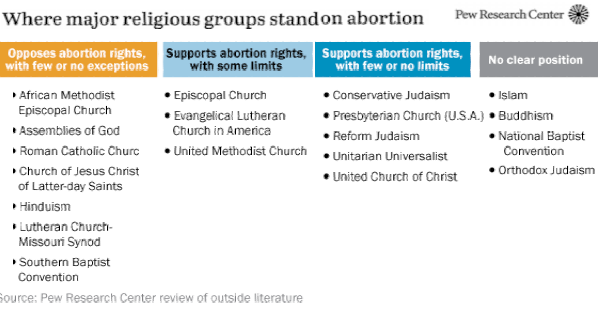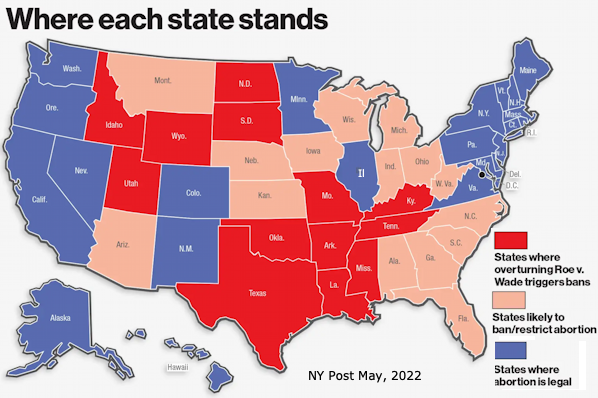 Politics
Politics
 Abortion
Abortion
Don's Home
 Politics
Politics
 Abortion Abortion
| Contact |
Contents: Supreme Court Decisions | When does life start? | Abortion Methods | Terms: | What the Bible Says: | Religious Guidelines: | State Laws: |
Supreme Court decisions:
In 1973 The Supreme Court decision Row vs Wade limited state's right to regulate abortion.
In 1992 Planned Parenthood v. Casey the court upheld Roe
In 2022 In Dobbs v. Jackson Womens Health Organizationa a conservative court overturned Row.
Pregnancy Detection:
The first sign of pregnancy is often a missed period, which happens around 15 days past ovulation (DPO). Some women may notice symptoms as early as 5 DPO, although they wont know for certain that they are pregnant until much later.
There are various other signs of pregnancy such as:
Cramping
Raised basal body temperature
...
As soon as the fertilized egg implants into the uterine wall, a pregnancy hormone called human chorionic gonadotropin (hCG) is produced.
. This means a high-quality pregnancy test could detect a pregnancy in as little as five days after conception.
There are claims that home pregnancy tests are 99% accurate, but its important to know the percentage of accuracy is not that high when the test is taken right at the time of a missed period.
According to the American Pregnancy Association, blood tests for hCG levels should be accurate 11 days after conception, while it would be best to wait 1214 days before taking a urine test.
Early signs of pregnancy can be easy to miss, especially if the person has not been pregnant before.
See 5 DPO: Early symptoms and when to take a pregnancy test
Heartbeat: Gestational Age Week 7 (Fetal Age: 5 weeks)
Some laws limit abortion after heartbeat.
Many have criticized these because many women do not know they are pregnant until after this time.
2. Second-trimester abortions have been inaccurately called late-term abortions. But thats a confusing term because the medical definition of late term refers to pregnancy not abortion.
3. Late-term is a medical term used to describe the very end of a pregnancy, after it has reached full term, from week 41 onward.
The latest point in pregnancy that you can have an abortion in the U.S. is 24 weeks.
See What Is a Late-Term Abortion, and What Is the Timeline? - GoodRx
In a town hall with Chris Wallace during the 2020 presidential campaign Pete Buttigieg put it into perspective.
"I think the dialogue has gotten so caught up on where you draw the line, that we’ve gotten away from the fundamental question of, who gets to draw the line? "
See What Pete Buttigieg's Late Term Abortion Comments Mean For Families
Row vs Wade specified that after viability, which includes the third trimester of pregnancy and the last few weeks of the second trimester, abortions could be regulated and even prohibited, but only if the laws provided exceptions for abortions necessary to save the "life" or "health" of the mother.
Half of abortions are now done with medication which is safe up to 10 weeks.
There have been bans on certain types of abortion. e.g.
Partial-Birth Abortion Ban Act 2003 - Wikipedia
The anti abortion argument uses Jeremiah 1:5 "Before I formed you in the womb I knew you, before you were born I set you apart".
Religious Guidelines:

Source: Where major religious groups stand on abortion | Pew Research Center, 2016
Islam
The Quran does not directly address intentional abortion, leaving greater discretion to the laws of individual countries..
There are four Sunni Islam schools of thought—Hanafi, Shafi‘i, Hanbali and Maliki—and they have their own reservations on if and when abortions can happen in Islam. It depends on when ensoulment occurs
Hanafi - 120 days.
Shafi - 80 days
Maliki and Hanbali - 40 days
See:
Islam and abortion
Judaism:
Orthodox Judaism opposes most abortion, but permits it when the pregnancy endangers the woman's life.
Judaism and Abortion by the National Council of Jewish Women says.
'Sources in the Talmud note that the fetus is “mere water”
before 40 days of gestation. Following this period, the fetus is considered a physical part of
the pregnant individual’s body, not yet having life of its own or independent rights. The fetus
is not viewed as separate from the parent’s body until birth begins and the first breath of
oxygen into the lungs allows the soul to enter the body.'
The Presbyterian (U.S.A) churches guidelines have generally been liberal during my lifetime.
"Currently the PC(USA)'s Social Justice and Peacemaking Unit works with the interdenominational Religious Coalition for Reproductive Choice."
The now-Advocacy Committee on Women's Concerns will bring up a overture on reproductive justice at the 225th General Assembly in 2022.
See Presbyterian Church (U.S.A.) - Reproductive justice and the PC(USA)
Note: The Presbyterian (U.S.A) is the largest Presbiterian denomination with about 1.2 Million members, but shrinking as Presbyterian churches leave to join other more evangelical/conservative Presbyterian denominations, primarily over same-sex marriage and related issues.
The Evangelical Presbyterian churches who oppose same-sex marriage are also pro-life. They are (membership):
Presbyterian Church In America (378K)
EPC - Evangelical Presbyterian Churches"(145K)
ECO - Evangelical Covenant Order of Presbyterians (130K)

See:
Pregnancy in health
Rights and the Supreme Court
What Is a Late-Term Abortion, and What Is the Timeline? - GoodRx
Islam and abortion - Wikipedia